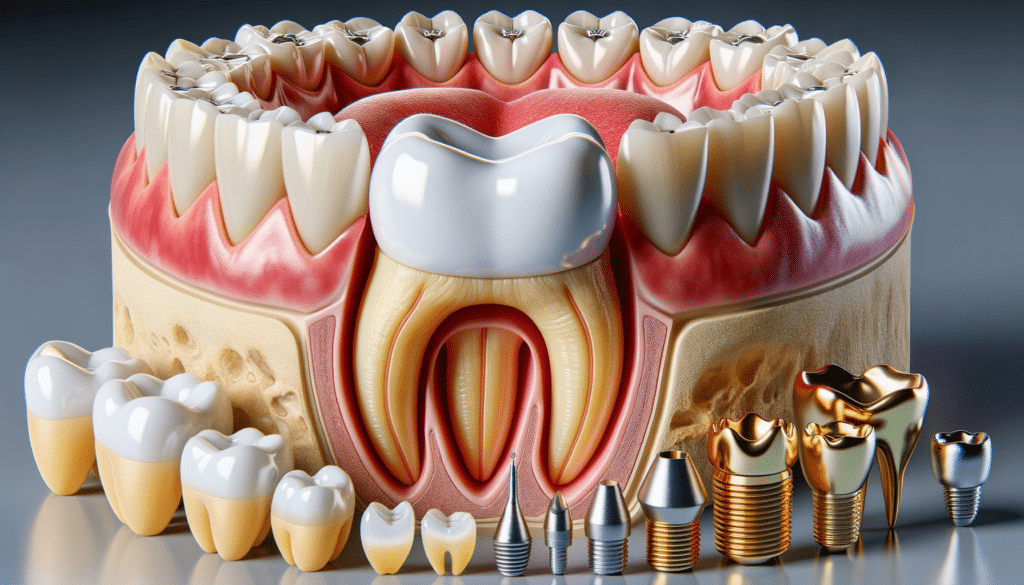Understanding Dental Crowns: An Overview
Dental crowns, often referred to as “caps,” are prosthetic devices cemented onto existing teeth or implants. They serve as a protective cover, restoring the tooth’s shape, size, strength, and appearance. Crowns are essential in dentistry for a variety of reasons, such as protecting a weak tooth from breaking, restoring an already broken tooth, or covering a dental implant.
These crowns are not just functional but also aesthetic. They are designed to blend seamlessly with natural teeth, enhancing the overall appearance of one’s smile. The materials used in crowns range from metal alloys, ceramics, porcelain, to composite resins, each offering different benefits and aesthetic qualities. The choice of material usually depends on the location of the tooth, the patient’s preference, and the dentist’s recommendation.
In essence, dental crowns are a versatile solution in dentistry, addressing both restorative and cosmetic needs. Their ability to improve dental health while also enhancing the visual appeal of teeth makes them a popular choice among patients and dentists alike.
Types of Dental Crowns: Material Matters
Dental crowns can be made from several different materials, each offering distinct advantages. Understanding these materials can help patients make informed decisions about their dental care.
Metal Crowns: These are made from alloys containing a high percentage of gold, platinum, or base-metal alloys. Metal crowns are known for their durability and are less likely to chip or break. They are ideal for molars that are out of sight due to their metallic color.
Porcelain-Fused-to-Metal (PFM) Crowns: PFM crowns provide a stronger bond than regular porcelain because they are connected to a metal structure. They are more durable than all-porcelain crowns and offer a more natural tooth color.
All-Ceramic or All-Porcelain Crowns: These provide the best natural color match and are an excellent choice for front teeth. However, they may not be as strong as porcelain-fused-to-metal crowns.
Resin Crowns: Resin crowns are a more affordable option, though they wear down over time and are more prone to fractures than other types of crowns.
When choosing a crown, factors such as the tooth’s location, the patient’s bite, and aesthetic preferences play a crucial role. Consulting with a dentist can provide clarity and guidance on the most suitable option.
The Procedure: What to Expect When Getting a Crown
Getting a dental crown typically involves two visits to the dentist. During the first visit, the dentist examines and prepares the tooth that needs the crown. This may involve taking X-rays to check the roots of the tooth and surrounding bone. If the tooth is severely decayed or if there’s a risk of infection or injury to the tooth’s pulp, a root canal treatment may be performed first.
Once the tooth is ready, the dentist will file it down to make room for the crown. The amount of tooth reduction depends on the type of crown used. After reshaping the tooth, the dentist will make an impression of the tooth and the surrounding teeth. This impression is sent to a dental lab where the crown is manufactured. In the meantime, a temporary crown is placed to protect the tooth.
During the second visit, the temporary crown is removed, and the new crown is checked for fit and color. If everything is satisfactory, the dentist will use a special cement to permanently fix the crown onto the tooth. With proper care, dental crowns can last between 5 to 15 years.
Benefits and Considerations of Dental Crowns
Dental crowns offer numerous benefits, making them a popular choice for many dental issues. They provide a protective cover for damaged teeth, preventing further decay or damage. Crowns also restore the function of teeth, allowing individuals to chew and speak properly.
Moreover, crowns can significantly enhance the appearance of teeth. They are custom-made to match the color, size, and shape of natural teeth, contributing to a more aesthetically pleasing smile. This can boost self-esteem and confidence in social and professional settings.
However, there are considerations to keep in mind. Crowns can be costly, and their price varies depending on the material used. Additionally, while crowns are durable, they can still chip or become loose over time, especially if not properly cared for. Regular dental check-ups and good oral hygiene are essential in maintaining the longevity of dental crowns.
Maintaining Your Dental Crowns: Tips for Longevity
Once a dental crown is in place, maintaining it is crucial for ensuring its longevity. Here are some tips to help keep your crown in excellent condition:
- Good Oral Hygiene: Brush your teeth at least twice a day and floss daily. This helps prevent decay around the crown.
- Avoid Hard Foods: Chewing on hard objects like ice or hard candies can damage the crown.
- Regular Dental Visits: Regular check-ups allow your dentist to monitor the condition of your crown and address any issues promptly.
- Address Bruxism: If you grind your teeth at night, consider using a mouthguard to protect your crowns.
By following these tips, individuals can maximize the lifespan of their dental crowns, ensuring they continue to enjoy the benefits of a healthy and attractive smile.





